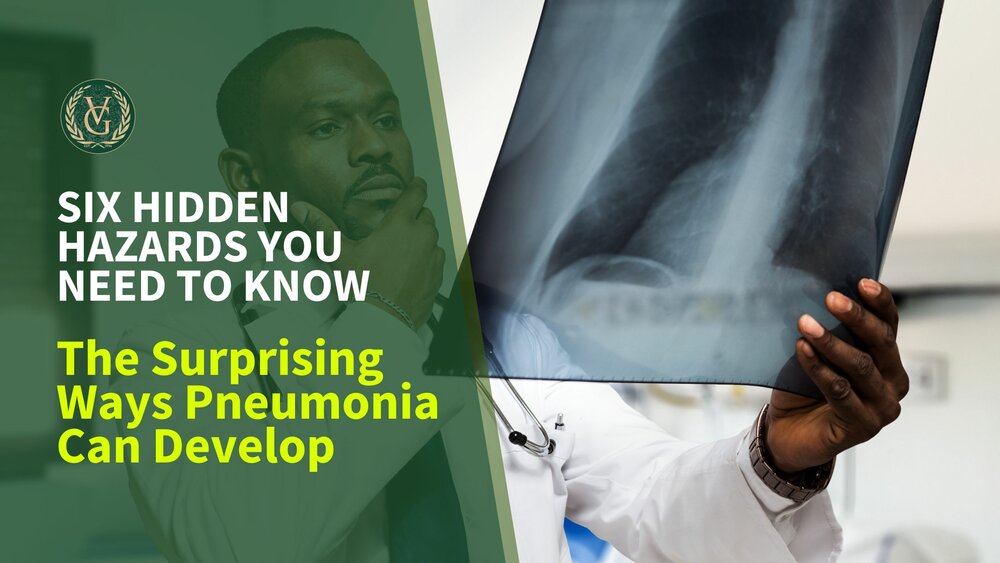Six Hidden Hazards You Need to Know: The Surprising Ways Pneumonia Can Develop
The ways pneumonia can develop often stem from seemingly minor or unrelated health concerns.
Together with the flu, pneumonia is a top cause of death in the United States. Surprised? According to data from the Centers for Disease Control and Prevention (CDC), it’s true. Pneumonia puts hundreds of thousands of Americans in the hospital every year, and more than 45,000 people die from the illness annually. The Pneumococcus bacterium and a bacterium called Haemophilus influenzae are two of the most common causes, but they are not the only ones.
In this article, we will share some surprising ways pneumonia can develop so you can protect yourself and your loved ones.
Five Facts about Pneumonia
- Pneumonia is an infection that inflames the air sacs in one or both lungs, causing cough with phlegm, fever, chills, chest pain, and difficulty breathing.
- Various organisms, including bacteria, viruses, and fungi, can cause pneumonia.
- The illness can range in seriousness from mild to life-threatening.
- It is most serious for infants and young children, people over the age of 65, and those with existing health problems or weakened immune systems.
- The pneumococcal vaccine is an important immunization that helps protect children and adults from various types of pneumococcal bacteria.
Get to Know These Six Hidden Hazards
1. Chronic medical conditions
Health conditions like diabetes, asthma, or heart disease can increase the risk of developing pneumonia. These underlying issues can weaken the immune system or reduce the body’s ability to clear out infections effectively. People with chronic medical conditions may experience more severe symptoms and longer recovery times when they develop pneumonia, making it crucial for them to take preventive steps such as vaccinations and regular health check-ups to reduce their risk.
2. Poor oral hygiene
Daily brushing and flossing are important for many reasons. Poor oral hygiene is associated with an increased risk of pneumonia because an unhealthy mouth contains more bacteria. The germs remain on drops of saliva that are inhaled and enter the lungs. When a massive number of bacteria enter the lungs, it’s much harder for the body’s built-in mechanisms to fully do their jobs, which increases the risk of pneumonia. Make proper daily oral hygiene a priority to reduce your odds of contracting it.
3. Vomiting
Vomiting can cause pneumonia or pneumonitis, an inflamed lung, which is similar to pneumonia. Pneumonitis occurs when an irritant is inhaled into the lungs. Gastric acid is the most common cause, and the most common reason for gastric acid in the lungs is throwing up. During a vomiting event, the stomach contents come up and often get into the lungs. This very acidic fluid in the lungs can cause an intense inflammatory response. Mild cases usually go away quickly, but more serious bouts may require oxygen therapy and can even cause fatal respiratory failure.
4. Environmental toxins
Exposure to air pollution, such as smog, smoke, and chemicals in the air, can weaken the respiratory system and increase the risk of pneumonia. Long-term exposure to environmental toxins like industrial fumes, cleaning chemicals, or particulate matter can impair the lung’s defense mechanisms and make them more susceptible to infections. People living in areas with poor air quality or those working in polluted environments, like factories or construction sites, are at higher risk.
5. Fungal spores
It isn’t just bacteria and viruses that cause pneumonia. Less commonly, fungi can also cause a lung infection. People who develop fungal pneumonia usually have weak immune systems. This includes organ transplant recipients, alcoholics, and people with diabetes, for example. Fungi are found in soil, mold, and animal droppings, and anyone who works in or around these environments regularly may be at risk of inhaling a mass of fungal spores. The body can often clear these fungi on its own. In more serious cases, however, antifungal medications may be needed.
6. Fireplaces and wood-burning stoves
Your wood-burning fireplace may seem cozy and charming, but it can harbor severe health consequences. Prolonged inhalation of wood smoke particles can damage lung tissue, weaken the respiratory system, and increase susceptibility to infections like pneumonia. To reduce the health risks, ensure your fireplace or wood-burning stove is properly vented and the chimney is regularly cleaned and inspected.
From daily habits to environmental factors, our respiratory health is impacted by many elements. By staying informed about the ways pneumonia can develop and adopting preventive measures, we can safeguard ourselves and our loved ones.
It’s easier to stay healthy when you have the right information. If you need additional resources, or if you have questions about pneumonia and how to avoid it, we are here to help. Please reach out to our caring team anytime.
About Vaughn Greene Funeral Services: For more than 25 years, Vaughn Greene Funeral Services has been providing a ministry of care to Baltimore’s African American community. As a leading local, minority- and family-owned provider, we promise to provide our highest level of service and respect to families who entrust us to honor their loved ones. For more information about our funeral, cremation, memorial, repast, and grief counseling services, please call us at 410.655.0015 or visit us online at https://vaughncgreene.com/.











Comments